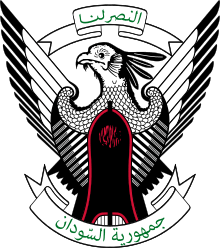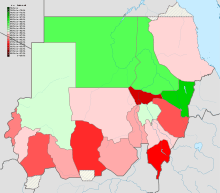Elections in Sudan
Sudan has had national level elections since 1948 while it was still an Anglo–Egyptian colony. Independence from or union with Egypt was a major electoral platform in the 1948 election.[1] In typical elections since then, Sudan elects on a national level head of state - the president - and a legislature. In the election of 2010, there were two presidential elections, one for the Presidency of the Republic of Sudan and one for the Presidency of the Government of Southern Sudan. Elections for the unicameral, 360-member National Assembly were last held in April 2015.
 |
|---|
| This article is part of a series on the politics and government of Sudan |
|
|
|
|
Judiciary
|
|
Administrative divisions |
|
|
Related topics
|
The National Legislature whose members were chosen in mid-2005 had two chambers. The National Assembly (Majlis Watani) consisted of 450 appointed members who represented the government, former rebels, and other opposition political parties. The Council of States (Majlis Welayat) had 50 members who were indirectly elected by state legislatures. All members of the National Legislature served six-year terms.
In the early twenty-first century, Sudan was a dominant-party state with the National Congress in power. Opposition parties were allowed, but were widely considered to have no real chance of gaining power.
On 11 April 2019, Sudan was taken over by a military junta after the military seized power from the President in a coup. Federal elections were tentatively scheduled for 2022 under the 2019 Sudanese transition to democracy deal.[2]
Latest elections
Presidential elections

| Candidate | Party | Votes | % | |
|---|---|---|---|---|
| Omar al-Bashir | National Congress | 5,252,478 | 94.05 | |
| Fadl el-Sayed Shuiab | Federal Truth Party | 79,779 | 1.43 | |
| Fatima Abdel Mahmoud | Sudanese Socialist Democratic Union | 47,653 | 0.85 | |
| Mohamed Elhassan Mohamed | National Reform Party | 42,399 | 0.76 | |
| Abdul Mahmoud Abdul Jabar Rahamtalla | Union of the Nation's Forces | 41,134 | 0.74 | |
| Hamdi Hassan Ahmed | Independent | 18,043 | 0.32 | |
| Mohamed Ahmed Abdul Gadir Al Arbab | Independent | 16,966 | 0.30 | |
| Yasser Yahiya Salih Abdul Gadir | Independent | 16,609 | 0.30 | |
| Khairi Bakhit | Independent | 11,852 | 0.21 | |
| Adel Dafalla Jabir | Independent | 9,435 | 0.17 | |
| Mohamed Awad Al Barow | Independent | 9,388 | 0.17 | |
| Asad Al Nil Adel Yassin Al Saafi | Independent | 9,359 | 0.17 | |
| Alam Al Huda Ahmed Osman Mohamed Ali | Independent | 8,133 | 0.15 | |
| Ahmed Al Radhi Jadalla Salem | Independent | 7,751 | 0.14 | |
| Isaam Al Ghali Tajj Eddin Ali | Independent | 7,587 | 0.14 | |
| Omar Awad Al Karim Hussein Ali | Independent | 6,297 | 0.11 | |
| Invalid/blank votes | 506,549 | – | ||
| Total | 6,091,412 | 100 | ||
| Registered voters/turnout | 13,126,989 | 46.40 | ||
| Source: NEC | ||||
Parliamentary elections
| Party | Proportional seats | Reserved seats | Constituency seats | Total seats |
+/– | ||||||
|---|---|---|---|---|---|---|---|---|---|---|---|
| Votes | % | Seats | Votes | % | Seats | Votes | % | Seats | |||
| National Congress | 3,915,590 | 78.32% | 67 | 4,321,901 | 83.37% | 107 | 149 | 323 | 0 | ||
| Democratic Unionist Party–Original | 218,120 | 4.36% | 4 | 249,768 | 4.82% | 6 | 15 | 25 | +23 | ||
| Collective Leadership Umma Party | 214,531 | 4.29% | 4 | – | – | – | 2 | 6 | +5 | ||
| Democratic Unionist Party | 114,806 | 2.30% | 2 | 137,265 | 2.65% | 3 | 10 | 15 | +11 | ||
| Federal Umma Party | 79,292 | 1.59% | 1 | 107,102 | 2.07% | 3 | 3 | 7 | +4 | ||
| Freedom and Justice Party | 60,373 | 1.21% | 1 | 36,899 | 0.71% | 1 | 1 | 3 | – | ||
| United Umma Party | 49,923 | 1.00% | 1 | 63,770 | 1.23% | 2 | 1 | 4 | – | ||
| Umma Reform and Development Party | 35,309 | 0.71% | 1 | 45,199 | 0.87% | 1 | 3 | 5 | – | ||
| National Umma Party | 30,966 | 0.62% | 1 | – | – | – | 2 | 3 | +2 | ||
| Federal Truth Party | 30,254 | 0.61% | 1 | 33,046 | 0.64% | 1 | 0 | 2 | – | ||
| National Bond Party | 30,079 | 0.60% | 1 | 43,199 | 0.83% | 1 | 0 | 2 | – | ||
| National Freedom and Justice Party | 29,642 | 0.59% | 1 | – | – | – | 3 | 4 | – | ||
| Constitution Party | 27,466 | 0.55% | 0 | 39,783 | 0.77% | 1 | 0 | 1 | – | ||
| Movement for Justice and Equality Party | 26,723 | 0.53% | 0 | 18,493 | 0.36% | 0 | 0 | 0 | – | ||
| National Reform Party | 25,990 | 0.52% | 0 | 30,107 | 0.58% | 1 | 0 | 1 | – | ||
| Popular Forces for Rights and Democracy Movement Party | 23,089 | 0.46% | 0 | 27,260 | 0.53% | 1 | 0 | 1 | – | ||
| Justice Party | 18,196 | 0.36% | 0 | – | – | – | 0 | 0 | – | ||
| National Movement for Peace and Development Party | 17,231 | 0.34% | 0 | 14,732 | 0.28% | 0 | 0 | 0 | – | ||
| Sudanese Socialist Democratic Union | 16,508 | 0.33% | 0 | – | – | – | 0 | 0 | – | ||
| People's Movement Party | 14,018 | 0.28% | 0 | 15,595 | 0.30% | 0 | 1 | 1 | – | ||
| Sudanese National Front Party | 12,740 | 0.25% | 0 | – | – | – | 0 | 0 | – | ||
| Sudanese Socialist Union Party al-Maywa | 8,686 | 0.17% | 0 | – | – | – | 0 | 0 | – | ||
| Centre Party for Justice and Development | – | – | – | – | – | – | 1 | 1 | – | ||
| General Federation of North and South Funj | – | – | – | – | – | – | 1 | 1 | – | ||
| Ana al-Sudan | – | – | – | – | – | – | 1 | 1 | – | ||
| Black Free | – | – | – | – | – | – | 1 | 1 | – | ||
| Independents | – | – | – | – | – | – | 19 | 19 | +16 | ||
| Invalid/blank votes | – | – | – | – | – | – | – | – | |||
| Total | 4,999,532 | 100 | 85 | 5,184,119 | 100 | 128 | 213 | 426 | –24 | ||
| Registered voters/turnout | – | – | – | – | – | ||||||
| Source: NEC | |||||||||||
See also
- Electoral calendar
- Electoral system
References
- "The Sudan Elections". The Spectator. 1948-11-26. Archived from the original on 2019-07-13. Retrieved 2019-07-13.
- Kirby, Jen (2019-07-06). "Sudan's military and civilian opposition have reached a power-sharing deal". Vox. Archived from the original on 2019-07-06. Retrieved 2019-07-06.
External links
- Adam Carr's Election Archive
- African Elections Database
- Elections and the Probability of Violence in Sudan
- Sudan Electionnaire
- sudanvotes.com
- Electoral Designs: Representation, Proportionality and Constituency Boundaries in Sudan's 2010 Elections